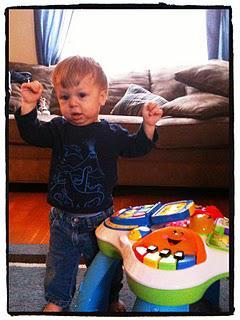After learning that Bean has WS, a lot of my friends and family have asked what they can do to help. Here's a few thoughts. And for the most part, these are applicable to anyone with a disability.

- Get informed. Get involved.
- Visit Williams Syndrome Association to learn more.
- Get involved with WS Awareness week or other events. Our family is participating in the Pittsburgh Walk for Williams on May 21 at 10am in North Park. Registration for this walk and information about other walks and events can be found at: www.walk4williams.com.
- If you can't attend an event, you can make a contribution at the www.walk4williams.com site. If you feel so inclined, you may make your contribution in honor of our sweet Bean. Please note that contributions are used to enhance the lives of individuals and families affected by WS and not to an individual family or person.
- Be empathetic. Sympathy and pity are not necessary for our family. We prefer to approach Bean's health, development and growth with positivity and optimism. We have accepted, embraced and are moving forward with Bean's dx. However, we appreciate your empathy when he (or Baby J, for that matter) is having a meltdown or just needs some rest and also when we are dealing with countless dr appointments and therapy sessions. I am working on an entire post about this, but it's important to get out there now...
- STOP using the r-word or engaging in activities that could be considered disparaging to individuals with intellectual and developmental disabilities and insist that others do the same. In any context at any time - even out of my range of hearing. I don't care if you are joking. I don't care if you didn't mean it "like that." It is not funny. It is not cute. It is not just a figure of speech. It is not just a joke. It is not just about being politically correct. The r-word is rooted in history as a negative reference to wonderful, beautiful people that may not be able to stand up for themselves. The word is hurtful and hateful. Plain and simple.
- Don't be afraid to hang out with our family or ask questions. We are still the same people we were before we got the diagnosis and WS is not a taboo topic. We love and cherish our relationships with our friends and family and value the time we spend with you and we want you to embrace Bean, and everything about him, just as we have.
